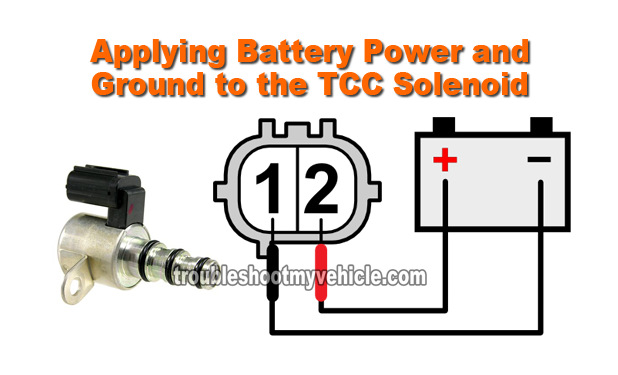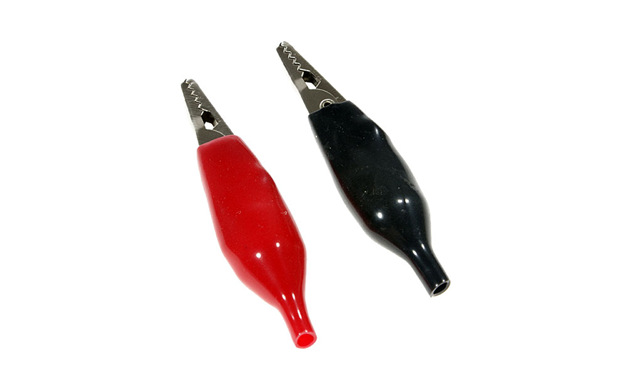TEST 2: Manually Applying Power And Ground To The TCC Solenoid


If you've reached this point, you have confirmed that you have a TCC solenoid trouble code causing the D4 light to blink (on your instrument cluster) and that the TCC solenoid's internal resistance is within specification.
Even thought the TCC solenoid's resistance is within spec., there's a good chance that it's internal valve is stuck.
The way to find out is to bench test it and see if you hear it making a clicking sound when you manually apply power and Ground to the torque converter clutch (TCC) solenoid from your Honda Civic's car battery.
You'll need to make your own jumper wires and I suggest using alligator clips with rubber insulating protectors (see photo 3 of 3 in the image viewer).
Using alligator clips with rubber insulating protectors will help you avoid shorting out the jumper wire that's carrying the juice (from the battery) to the solenoid.
OK, this is what you need to do:
- 1
Connect torque converter clutch (TCC) solenoid terminal #2 to your Honda Civic's battery positive terminal.
NOTE: Take all safety precautions when applying these 12 Volts to the terminal. - 2
Connect torque converter clutch (TCC) solenoid terminal #1 to Ground (or your Honda Civic's negative battery terminal).
- 3
You should hear a clicking sound as soon as you Ground solenoid terminal #1.
Let's take a look at your test results:
CASE 1: The torque converter clutch (TCC) solenoid clicked. This is the correct and expected test result.
If you're still having a torque converter clutch (TCC) solenoid trouble code, take a look at the test suggestions found here: TCC Solenoid Is OK But Transmission Still Not Shifting.
CASE 2: The torque converter clutch (TCC) solenoid DID NOT click. This test result tells you that the torque converter clutch (TCC) solenoid is fried and needs to be replaced.
TCC Solenoid Is OK But Transmission Still Not Shifting
If you've tested and found the TCC solenoid is OK, yet a P1753, P2769, or a P2770 keeps popping up, I would suggest that you:
- Check the continuity of circuit #2 between the TCC solenoid and the PCM with a multimeter.
- Check the continuity of circuit #1 between the TCC solenoid and the PCM with a multimeter.
The above two test will help you eliminate a possible ‘open’ in the wiring between the TCC solenoid and the PCM. To be able to do this, you'll need a wiring diagram of your specific Honda Civic.
If after testing the wiring and you find no faults, then there's a good chance that you'll have to replace the shift solenoid in question to see if replacing it solves the problem. I know this isn't something you want to hear, but in some cases there's just no other way to troubleshoot the issue (I speak from personal experience and from comments other readers have sent in).
If after testing the solenoid, its related wiring, and/or replacing the shift solenoid and the problem still persists, then you either have a bad transmission (internal mechanical/hydraulic problem) or the PCM is bad. Before you run out and buy a PCM, let me tell you that it's very, very rare for a PCM to go bad and keep the transmission from shifting (it does happen but you're more likely to get hit by lightening that have this happen to you).
Now, if your Honda's transmission is slipping, then replacing the shift solenoid in question isn't gonna' help bring the transmission back to normal. Slippage is a direct result of internal damage to the friction discs or hard parts. The only way to solve a slippage issue is overhauling the transmission.
More Honda Civic Test Tutorials
You can find a complete list of Honda Civic tutorials in this index: 1.7L Honda Civic Index Of Articles.
Here's a small sample of the tutorials you'll find in the index:
- How To Test The Crank Sensor (2001-2005 1.7L Honda Civic).
- Maintenance Required Light Reset (2001-05 1.7L Honda Civic).
- How To Do A Cylinder Balance Test (2001-2005 1.7L Honda).
- How To Test Trouble Code P0141 (2001-2005 Honda 1.7L).
- How To Test The TP Sensor (2001-2005 1.7L Honda Civic).
- How To Test Trouble Code P0135 (2001-2003 Honda 1.7L).

If this info saved the day, buy me a beer!




